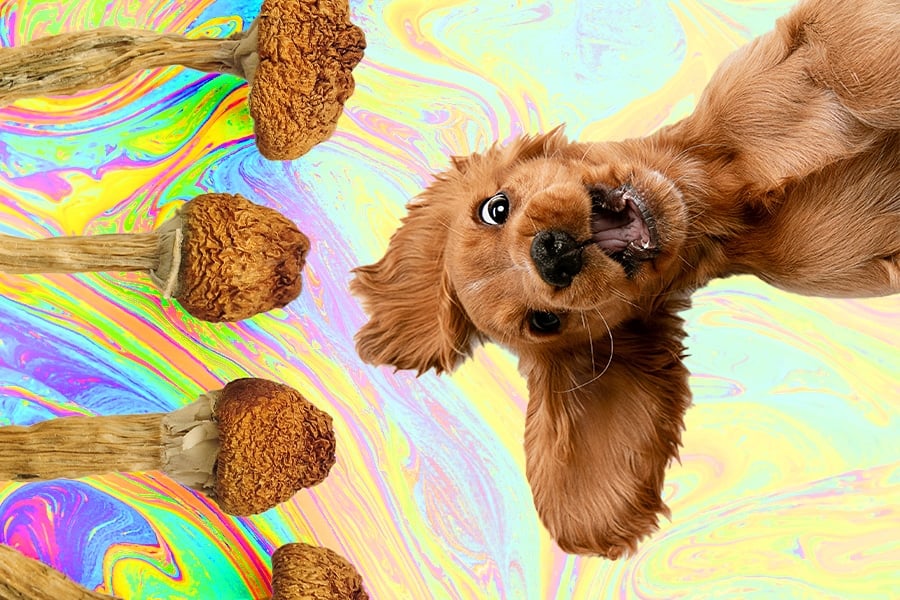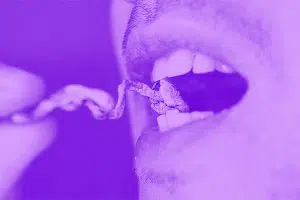Dogs will eat just about anything—a fact that most pet parents know all too well. That piece of chocolate cake on the coffee table? Gone. Your favorite running shoes? Destroyed. That fresh batch of mushies you just found? Swallowed before there was even time to chew. Thirty minutes to an hour later, you’ll find your dog tripping—and possibly very sick.
What Happens When Dogs Eat Shrooms?
We’ll be blunt: it is not a good idea to give dogs psychedelic mushrooms. Nor is it a good idea to keep psychedelic mushrooms within your dog’s reach, where they might accidentally eat the fungi. The American Society for the Prevention of Cruelty to Animals claims that magic mushrooms may cause tremor and seizure in rare but severe circumstances—the latter can be life-threatening. More often than not, however, your dog may demonstrate many of the same characteristics that intoxicated humans do:
- Stumbling
- Dilated Pupils
- Disorientation
- Panting (increased respiration)
- Chills (hyperthermia)
But, that’s certainly not all: Your dog may vomit and become physically ill. An intoxicated dog may whine or howl. Your dog may show signs of anxiety, discomfort, or agitation. Although it may appear like some dogs enjoy the psychedelic state, there is no guaranteeing that they will have a good trip. And, to a dog, a bad trip can be very bad indeed.
Read: Types of Magic Mushrooms: 10 Shroom Strains You Should Know About
Do Dogs Eat Psychedelic Mushrooms on Purpose?
The notion of dogs eating psychoactive plants and fungi is not novel. The psychedelic compounds in magic mushrooms affect many animals—dogs, cats, and humans included. The idea of trippy animals has been explored in ethnobotanical research. A 2015 paper published in the Journal of Ethnopharmacology highlights that, in various cultures around the world, psychoactive plants are given to hunting dogs to improve their performance—as author Michael Pollan cites in his book How to Change Your Mind.
Some animals may even seek out psychedelic mushrooms themselves, although the evidence is more story than science at this point.
“The material is sketchy but has me convinced,” mycologist Michael Beug, author of Mushrooms of Cascadia, wrote in an email to DoubleBlind. “What I have is mostly anecdotal and mostly applies to isoxazoles—the mind-altering substances in the Amanita muscaria complex and the Amanita pantherina complex.” Beug earned the title of Professor Emeritus at Evergreen College in Washington state, where he began teaching in 1975. He is also an esteemed member of the North American Mycological Society, spending ample time speaking at conferences and engaging in mycological research. In his 49-year-history in the field, Beug has encountered his fair share of odd stories.
“Owners have reported that their dog has eaten one of these species and appeared uncoordinated and high—and then very sick. But, [the dog] would eat the mushrooms again as soon as they recovered if they were out and found the mushrooms again,” says Beug. “One report involved several pet ducks high on these mushrooms.”
How to Grow Shrooms Bundle
Take Both of Our Courses and Save $90!
“In one weird case from eastern Washington,” he continues, “a cat owner reported that her cat would dig up and eat a specific Coprinus species (even before it emerged from the soil and was visible). The cat would then lose muscular coordination and appear high or drunk. The cat habitually sought this mushroom.”
Yet, these anecdotes are not proof that the psychedelic mushrooms affect animals and humans in the same way; nor are they proof that other animals enjoy psychedelic trips in the way that humans do (Amanita muscaria toxins can be lethal to cats). Many of these encounters may have been entirely accidental. As in one case, a horse “appeared high and the owner found Psilocybe mushrooms in the pasture.” In this instance, Beug mentions that there was no report of repeated ingestions.
But, although the notion of animals on psychedelic adventures is undoubtedly food for thought, it’s never wise to intentionally give your dogs shrooms, nor is it wise to keep psychedelic mushrooms within muzzle range of your pets. Sealed containers stored up high and out of reach are the most responsible ways to store psychedelic mushrooms, should you be lucky enough to live in a region where they have been decriminalized.
Read: Why Are Shrooms Illegal?
What To Do If Your Dog Eats Magic Mushrooms
If your dog eats magic mushrooms, it’s time to take your furry friend on a very different trip: to the vet. A veterinarian may administer activated charcoal and induce vomiting in your dog, techniques which seek to remove poisons from your dog’s system as quickly as possible. It’s always best to follow the guidance of a veterinary professional, first and foremost. Yet, there are a couple of things to know as you head off to the clinic:
Get Specific
If you know for a fact that your dog has consumed a magic mushroom—be it a Psilocybe, Amanita muscaria, or another properly identified species—call your vet and be honest about what has happened. Name the exact species, if possible, as well as the amount that your pet ingested. Knowing the precise mushroom species your dog consumed will help your veterinarian determine the potential danger to your pet. It will also help your vet decide on the best course of treatment. If you’re most comfortable caring for your dog at home, ask the vet for their expert opinion on home recovery and make a clear plan for an emergency.
Don’t Assume
If you suspect that your dog has mushroom poisoning, it’s best to take them to the vet as soon as possible—don’t assume that they’ll recover on their own. Many fungal compounds can make a dog seriously ill, with some causing potentially life-threatening organ damage. It’s important to begin treatment as quickly as possible, especially if you cannot say with certainty that your dog ate a known magic mushroom species.
Keep Your Dog in a Safe and Quiet Place
Many veterinarians will keep your dog for monitoring when they come into the clinic with mushroom toxicity. With treatment, most dogs who have eaten psychedelic mushrooms will be released within 12 hours. However, if your pet appears to be in stable condition, your veterinarian may feel comfortable releasing your dog for home recovery. During this time, it’s wise to keep your dog in a warm, clean, safe, and quiet place. Human company, warm bedding, and easy access to fresh water are helpful.
And, who knows? Your dog may even enjoy a little trip outside.

DoubleBlind is a trusted resource for news, evidence-based education, and reporting on psychedelics. We work with leading medical professionals, scientific researchers, journalists, mycologists, indigenous stewards, and cultural pioneers. Read about our editorial policy and fact-checking process here.

DoubleBlind Magazine does not encourage or condone any illegal activities, including but not limited to the use of illegal substances. We do not provide mental health, clinical, or medical services. We are not a substitute for medical, psychological, or psychiatric diagnosis, treatment, or advice. If you are in a crisis or if you or any other person may be in danger or experiencing a mental health emergency, immediately call 911 or your local emergency resources. If you are considering suicide, please call 988 to connect with the National Suicide Prevention Lifeline.



